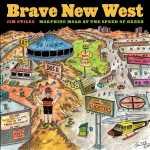
 |
Brave New West
Morphing Moab at the Speed of Greed
Jim Stiles
272 pp. / 7.0 x 7.0 / 2007
Paper (978-0-8165-2474-7)
$19.95
Pain, passion, persistence—while it is not chronologically possible for Jim Stiles to be the reincarnation of Edward Abbey, he stands solidly in Abbey’s
big boots. We could use a thousand more of Stiles, as a writer, as a man of
fury, as a transmitter of reality.
—Mary Sojourner, NPR contributor and author of Solace: Rituals of Loss and Desire
No one but Stiles can deliver the bad news to us and make us laugh; then
flip to provocative challenges that tweak our tails. We find all this, and more,
in
Brave New West, where he defines some true meanings of that over-used, misused
word--"environmentalist"-- and asks us to reconsider if we honestly are the protectors
of nature and wilderness we always thought we were.
--Katie Lee, author of Sandstone Seduction: Rivers and Lovers, Canyons and Friends.
Jim Stiles, a fighting editor, taking outrage as a requirement for optimism, is rigorous as an investigative journalist, but also highly personal and insightful. Not your ordinary nature text, this book gives us individuality writ large, author included, people in the grip of history and environmental intimacy, whether they know it or not.
—Martin Murie, author of Losing Solitude
You don’t have to live in the West to feel the joy and loss of a place where
landscape is the most passionate love affair of all.
—Susan Zakin, author of Coyotes and Town Dogs
Jim Stiles holds up a mirror to those of us living in the American West,
exposing issues we may not want to face. We are all complicit in the shadow side
of growth.
His words are born not so much out of anger but a broken heart. He says he writes
elegies for the landscape he loves, that he is "hopelessly clinging to the past." I
would call Stiles a writer from the future. Brave New West is a book of import
because of what it chooses to expose.
--Terry Tempest Williams, author of RED - Passion and Patience in the Desert
When Jim Stiles moved west from Kentucky in the 1970s to make Moab, Utah his
home, that corner of the West had already endured decades of obscurity, a uranium
boom and then a bust, and was facing an identity crisis. What kind of economy
would prevent Moab from becoming yet another ghost town? For more than two decades,
environmentalists in southeast Utah have had a simple answer to this question:
replace extractive industries—mining, timber, and cattle—with an economy catering to “green” tourists with hotels, restaurants, and bars. They feel that if these lands can be spared further degradation by huge industries, the West could begin to thrive on something cleaner and more lucrative. But Stiles sees a downside to this seemingly idyllic vision. Bringing insight based on decades of residence in Moab, he makes a provocative and compelling argument that the economy most environmentalists hail as the solution to the woes of the rural West is in fact creating an unprecedented impact of its own. In recent years, Moab and other rural towns across the West have seen a massive influx of urbanites fleeing crowded cities in search of a simpler life. Yet Stiles also observes that these transplants are often unwilling to accept the isolation and lack of services that characterize genuine rural life. Believing themselves to be liberal, sensitive, enlightened environmentalists, they nevertheless bring with them exactly the type of lifestyle and ecological impact that they sought to leave behind and, in the process, create a community that no longer serves the native inhabitants. With a blend of travelogue, local color, and geography, Stiles engages readers with folksy humor while defending the lifestyle of the “pre-cappuccino rural Westerners” and
exposing the paradox that underlies the professed good intentions of liberal
newcomers.
Visit us online at:
www.uapress.arizona.edu/BOOKS/bid1786.htm
Jim Stiles will be at Ken Sanders Rare Books in Salt Lake City on March 30 at 7 pm and at Back of Beyond Books in Moab at 7 pm on April 13. |
|

